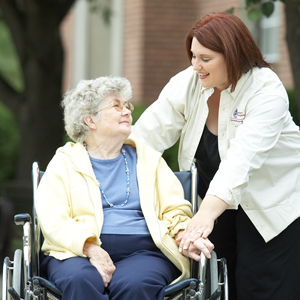Depression is Not a Part of Aging.
Blog | December 6, 2016
Seniors and depression: tips for coping
Depression is a common treatable mental health condition that can manifest at any age. Although up to 20% of seniors experience depression, they are less likely to be diagnosed and treated. Depression creates barriers to enjoyment of life, and caregivers can play an important role in helping to lift them.
How Does Depression Affect Seniors?
Depression can manifest itself in unique ways in older adults. While sadness is a common feature of depression in younger people, seniors are more likely to show a lack of energy, low motivation and physical symptoms such as worsening pain. A loss of interest in previously enjoyed activities, social isolation, loss of appetite and a decline in self-care are important signs to look for as well.
Distinguishing between grief and depression is difficult, but not impossible. Grief can ebb and flow and involve many different emotions, including moments of happiness and pleasure. People suffering from depression have difficulty emerging from feelings of emptiness and despair, including in moments where they would previously have found joy.
Depression can severely interfere with quality of life, and can lead to a decline in physical health and independence. Studies have shown that hospitalized seniors with depression have poorer health outcomes than those who do not have depression. Identifying and treating depression can greatly improve the capacity to heal and recover from illness and injury.
Barriers to Diagnosis and Treatment of Depression
Concerted efforts to reduce stigma around mental illness have led to great strides in awareness and acceptance in recent decades. However, certain negative attitudes and beliefs about mental illness may prevail in older generations, which can lead to shame, denial and embarrassment.
Furthermore, the expectation that older adults will naturally experience more sadness, isolation and dwindling motivation and energy, can lead caregivers to overlook the signs of a treatable episode of depression. Identifying and acknowledging signs of depression means placing continued value on enjoyment of life as we age. Depression is not a part of aging.
How You Can Help
If you are concerned about whether you, or someone you care for, may be depressed, this short questionnaire can help estimate risk of depression in seniors. While these questions may generate some difficult discussions, listening with compassion and patience is key to establishing an open dialogue. If you have concerns, offer to support your loved one in a discussion with their primary care physician, who can make an accurate diagnosis and help develop a treatment plan.
Treatment of depression can be a critical element of a care plan, as it can significantly prolong health and independence. A growing body of science around the medical treatment of depression in seniors is allowing physicians to tailor treatments to the unique needs of this population.
Exercise, nutrition and good social supports can have profound positive impacts on mood. Creating opportunities for activity and social interaction will be an important part of treatment. Volunteering, helping take care of a pet, learning a new skill or taking part in spiritual or religious activities can increase a sense of belonging, self-worth and social connectedness.
A 2011 review of mental health strategies for seniors by Université du Québec á Trois-Rivières showed that the most effective approaches were those that involved the establishment of personal goals that give meaning and purpose to life. Supporting your loved one in establishing and achieving these personal goals can play a crucial role in reducing the symptoms of depression and allowing your loved one to enjoy life again.
If you need support, strategies to manage depression can be incorporated into our care plans. Contact us today for a free consultation.
Individualized Home Care Options
Long-Term Home Care, 24 Hour Home Care & Short Term Care Options Customized for You







